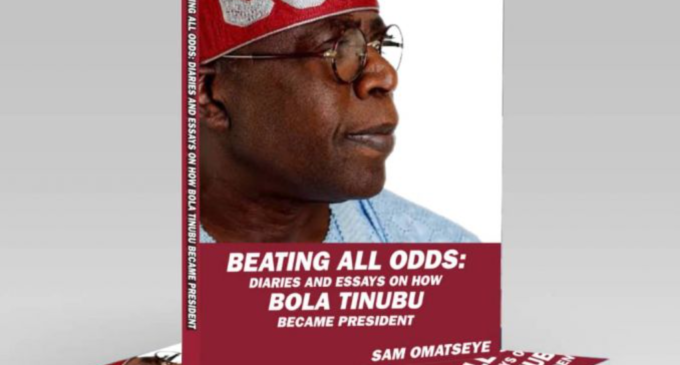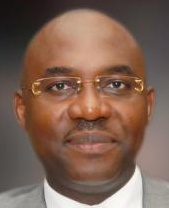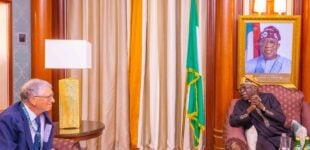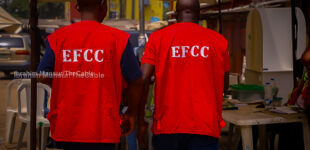Sam’s prophetic muse: Tracking Jagaban’s rise to power

Apart from being a strategy against defective memory, diary-keeping is an extraordinary tool in literary craftsmanship. One, it infuses writing with greater realism or a deeper breath of reality if you like. In English literature of the early twentieth century, the technique was popularised by writers like Bruce Cummings, who adopted the pen name, Nero Barbellion, and his major work is entitled, ‘The Journal of a Disappointed Man’.
As the title suggests, ‘The Journal of a Disappointed Man’ is a bitter-sweet account of a provincial young man who arrives in London to start a career in science, then he becomes disillusioned and begins to stumble from one unhappy love affair to another. His emotional misery is soon compounded by the onset of ill-health which searing pains he details meticulously until the approach of death.
Sadly, Cummings died at the age of 30 in 1919.
Back home, we see the technique of diary deployed by our own Nobel laureate, Professor Wole Soyinka, in his prison memoirs entitled, ‘The Man Died’. To his jailers who sought to break his spirit by starving him of reading and writing materials for more than two years, “Eni-Ogun” overcame by scribbling his thoughts on toilet sheets and other forms of improvisation while in prison.
But unlike Soyinka’s case which dwells on the Nigerian civil war, the diary is, of course, implicated in a bitter love story many of us are familiar with, which is documented by one of the former spouses of a one-time Nigerian leader. In a language of spite, the grand old lady chronicles a riveting love story that initially sizzled on British soil, only to devolve into bouts of domestic fisticuff after the couple returned to Nigeria.
Of course, someone took the position of First Lady when her former husband eventually became a two-time Nigerian leader. But never mind. To those who might be gloating at hijacking the fruits of someone else’s labour, she reveals some dark secrets. In her tell-all, she details, in black and white, how the future commander-in-chief used to diligently launder, not with a washing machine, but bare hands her dirty undergarments in the winter cold of London back in the day.
As if to remind the new mistresses that what they now claim to possess is not exactly factory new, but a fairly-used vessel.
However, Sam Omatseye’s book is neither about estranged lovers nor forsaken love. ‘Beating All Odds: Diaries and Essays on How Bola Tinubu Became President’ is a meticulous chronicle of events preceding and following arguably the most divisive election in Nigeria’s history. It gives context and content to a phrase recently enrolled in our political lexicon — “EMILOKAN”.
Sam’s book is divided into two parts — the diary section and the other a potpourri of essays published as columns in The Nation newspaper. The diary opens on August 19, 2022, after the presidential flag-bearer of APC had emerged, and was now arrayed against the candidates of PDP, Labour and NNPP ahead of the 2023 general elections.
The diary closes on February 17, 2023, a week before the elections.
In Part 1 of the book, Sam vividly captures the dramatic twists and turns, the high and low moments of the electioneering season. From the insurgency of pastors against APC’ Muslim/Muslim ticket to the intifada of northern hegemons paranoid at the prospects of the North relinquishing power to the South after Buhari’s eight years at the Presidential Villa. From the feral rampage of Labour’s online trolls to the unprecedented absurdity of a former central bank governor practically draining the national economy of cash in a desperate manoeuvre to rig the electoral outcome against Bola Tinubu, the reader is confronted with the prospects of a macabre drama.
Sam’s entries also do not exclude the comedies of Wike’s mocking dance steps and the accompanying guttural lyrics of “As e dey pain dem, e go dey sweet us” and “Yemdeba… Yemdeba… Yemdeba… Yemdeba”. Nor the leak of the illicit invocation of “Yes Daddy” by one of the candidates in what was supposed to be a nocturnal chat with his spiritual godfather, in the pursuit of a sectarian agenda.
In PDP, we are reminded of how the flag-bearer called the five insurgent governors “traitors” who don’t respect elders and the accused in turn call Atiku a “prodigal father” blinded by inordinate ambition for 30 years.
In the media, we see top journalists engaged in foul exchanges in the pursuit of conflicting interests until the media elders imposed a ceasefire.
Of course, Sam’s radar also captures the audio apparition of a former leader — one of the so-called “Owners of Nigeria”, a great granddad for sure and prolific, all-knowing letter-writer camped close to Olumo Rock, inciting unsuspecting youths to march on the streets of Lagos and Abuja when early results indicated his anointed candidate was losing, not minding if they ended up as a sacrificial lamb in a possible crossfire, all in a last-ditch attempt to truncate democracy and set Nigeria back on the road of June 12.
In a way, this is also a book of vindication that is not just poetic in cadence, but also prophetic in prognosis. The great romantic poet, Percy Shelley, tells us that “poets are the unacknowledged legislators of the world”. With an uncommon prescience, most of what Sam said came to pass indeed. The man he pitched for won. How prophetic his essay entitled, “Again, a Lagos Original”, published on February 20, barely five days to the much-anticipated D-Day, turned out.
Hear the author: “He (Tinubu) is rich. He is powerful. He has influence. He has changed lives. He transformed a city and made men and women. Yet he attracts quite a few adversaries. The scriptures say when Isaac roared into success, the Philistines envied him.
“They deny him the right to be human. When he is sick, some wish him dead or eternally crippled. When he is not seen, some conjure his ghost as a dead soul. When he reappears, they won’t even credit him as a revenant, a man who came back from the dead. Rather, they wait for another date with the grave – in their imagination. Through the primaries, he gulped up mileage against his opponents’ little acreage. In the elections season, he bounded from huge crowd to huge crowd with breathtaking regularity. His opponents, including the ‘youth’ among them, waited to take a breath and measure the breadth before the next flight.”
As for those who pronounced a “fatwa” on the writer for exercising a poetic license in coining “Obi-tuarists” in August 2022, Sam could be said to have had the last laugh when the ballots were tallied in March 2023.
For four months, we learnt that Sam was advised, as a precaution, to stay completely off the radar while Obi’s supporters preached hate in what evoked the dark memories of Salman Rushdie’s ordeal after Iran’s Ayatollah Khomeini pronounced a fatwa on his “Satanic Verses”. But, alas, the bullies grew limp and desolate once their idol lost.
But rather than gloat, in an essay entitled “I Pardon All” published on June 19, 2023, conciliatory Sam writes: “It was a pun but they did not see the fun. Yet, I am not writing in jest, but to follow the rhetorical footprints of President Bola Tinubu in his inaugural speech that echoed another great man, Abraham Lincoln. I write, as this essayist has always done, with ‘malice towards none.’
“When I wrote the piece, Obi-tuary, there was a tempest in the land… It was a hectic time for me and my loved ones. I did not go to the office for four months. I was a hermit, except for my trips to the TVC Breakfast Show, and I had got here in disguise. I attended no parties, no public events, and no restaurants. I was as Americans say a home buddy. But I forgive all. I forgive them who did not understand English enough to know that I was using a figure of speech.”
Again, the central banker Sam pooh-poohed yesterday is now today’s butt of a national joke for presiding over a criminal enterprise. Long before Godwin Emefiele fell on his sword of fiscal perfidy, Sam had seen it coming in a satirical piece entitled “Mefy’s beauty”, published on November 7, 2022. Listen to him: “Godwin Emefiele must think himself a great economist and stylist. Or maybe he sees himself as a sort of reincarnation of Steve Jobs, the Apple avatar who brought design to the service of technology. Mefi, as his acolytes call him, must believe he wants to bring style to the service of the economy.
“So, to do this, he goes to the president and tells him it is an elixir of good news. Mop up the naira and the politicians who stashed away money will groan. It will smoke out bandits from their barricades. The naira will neigh like a robust horse. Inflation will bow. The common folk will renew ‘Sai baba’ chants. His unsung legacy on song.”
As prophesied, Emefiele only ended up wrecking a national economy he was hired to nurture. Of course, while the great magician performed all sorts of abracadabra at the exchequer, he was egged on by a tribe of media contractors who often outdid themselves in declaring him either “Banker of the Year” or “Banker of the Decade” regularly. But following a raft of serious charges brought against Emefiele in court, the media praise singers have since lost their voices.
When Emefiele’s campaign posters first appeared on the streets, Sam was one of the few courageous columnists who bucked the conspiracy of silence in the media by voicing outrage against the sacrilege in a piece entitled “Here We Go”.
Hear him: “An abuse of office is going on with Godwin Emefiele. His so-called committee of friends failed to protect the CBN governor. Rallies are around town. Posters are everywhere. He is still mum. If he wants to run for president, he should resign his office. He should not hide under pieties about God or Muhammadu Buhari. He wants to have his dollars and pounds in one transaction. He should either run and resign or stop an amorphous group from trumpeting an ambition for a man whose only image outside of banking is a kneeling posture to some oligarchs.
“It is an abuse of office to enable a shadowy crowd of friends fretting in public over questions of the CBN chief who is stumbling to segue from a technocrat to a democrat. The so-called committee of friends was a shadow show. It was a limp exhibition, whose prose called for better editing. Emefiele has a spokesman officially. That is the only voice that counts, not a camaraderie of cowardice hiding under a coterie of friends.”
Unperturbed and unashamed, Mefy’s hired flautists doubled down in a rejoinder splashed in a sponsored two-page advertorial in The Nation newspaper.
Without a doubt, this book is significant because it is the first attempt at documenting a momentous period in our recent history. As many will now agree, never in living memory has the nation found herself dragged into an electoral contest where religion and region were brazenly weaponised.
Nor has the nation ever witnessed an aberration where the sitting administration was viewed, rightly or wrongly, as working energetically and transparently against the victory of the candidate of its party in a national election.
One remarkable thing about the diary Sam kept for seven months is the sense of great suspense, and dark foreboding expressed by the writer as the nation tottered dangerously near the precipice.
For instance, hear Sam’s suspense-filled entry on February 17, 2023: “The week before the election shaped out very tense, especially for the ruling party. It seems obvious that the worries that Asiwaju Bola Tinubu expressed about efforts to scuttle his path to victory have never been better revealed than when the president went on television and defied the Supreme Court ruling.
“The president gave ammunition to the other contestants because his decision energised the rage against his government and the APC. He decided against the suggestions of the Council of State, against the ruling of the Supreme Court, against the judgment of the governors and many people in the political class and civil society. His decision was in lockstep with that of the CBN chief, the Labour Party’s presidential candidate Peter Obi and PDP counterpart Atiku Abubakar.”
Overall, there is no disputing that Sam writes with the fragrance of a much-decorated poet and the gravitas of the nation’s most garlanded, most consistent columnist in the last two decades. As The Nation’s columnist in the last 18 years, not once has Sam failed to deliver every Monday. His multidisciplinary depth surely shines through this chronicle. But even more evident is the authority Sam brings. As a senior editor with a vast network of contacts in high places, he surely knows, smells and hears things not open to small players.
However, it must be said that, here, Sam is not a neutral chronicler. Indeed, in Nigeria’s literary community, only a few can be said to be as invested as Sam in Nigeria’s democratic struggle when the cost was most prohibitive. To ignore the history of the popular struggle against military despotism of the 90s is to, therefore, completely miss the spirit that feeds Sam’s muscular metaphors.
Not many will remember that, as Concord editor in 1997, the writer narrowly escaped being captured by then-rampaging Abacha goons at the Muritala Mohammed International Airport in Lagos. He and Tunji Bello, his inseparable ideological twin brother, had turned Sunday Concord newspaper into a thorn in Sani Abacha’s flesh. Of course, that close shave with the death squad of the military regime marked the beginning of Sam’s 10-year self-exile in the U.S.
Well, Aristotle said we are all political animals. The difference with Sam is that he does not hide his bias in sophistry. His partisanship is undoubtedly for Bola Tinubu, a key player in the pro-democracy struggle of the 90s. No wonder, in this book, Sam is unsparing of those he considers traitors to Asiwaju. And they are quite many. From those who climbed on Tinubu’s back to power in Abuja and later denied the help, to those who disowned him in his hour of political need. They know themselves.
Overall, contrarians are likely to find Sam’s language rather offensive or maybe exaggerated sometimes. But as Khalil Gibran tells us, exaggeration is only a truth that has lost its temper.
However, as magnificent as it appears, Sam’s offering is not without its production infelicities which border largely on the infiltration of non-English words or phrases. They permeate the entire work. But Sam must be reminded that not everyone speaks or understands Yoruba or his native Itshekiri. Conventionally, such words are italicized or put in inverted commas. These can corrected in the next issue of the book.
All said, the book is, in my view, a razor-sharp snapshot of Nigeria at a critical moment. I strongly recommend you get a copy and read it.
Thanks for listening.
Views expressed by contributors are strictly personal and not of TheCable.















There are no comments at the moment, do you want to add one?
Write a comment